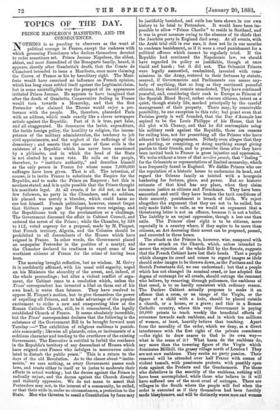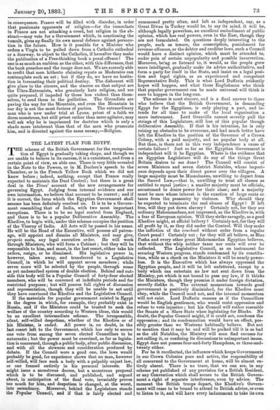TOPICS OF THE DAY.
PRINCE NAPOLEON'S MANIFESTO, AND ITS CONSEQUENCES.
NOTHING is so puzzling to observers as the want of political courage in France, except the rashness with which governing Frenchmen who declare themselves devoted to order sometimes act. Prince Jerome Napoleon, the eldest, ablest, and most discredited of the Bonaparte family, heard, it appears, shortly after Gambetta's death, that the Comte de Chambord intended to issue a Manifesto, once more claiming the Crown of France as his by hereditary right. The Mani- festo would have exercised no influence on French opinion, which has long since settled itself against the Legitimist claim, but in some unintelligible way the prospect of its appearance irritated Prince Jerome. He appears to have imagined that after the death of Gambetta, Conservative feeling in France would turn towards a Monarchy, and that the first Pretender who claimed the Throne would enjoy a pre- ference with the people. He, therefore, placarded Paris with an address, which reads exactly like a clever newspaper article against the Republic. Part of it is true, part false, and all exaggerated. He denounces the lavish expenditure, the feeble foreign policy, the hostility to religion, the incom- petence of the military administration, the tendency to job civil appointments, and the neglect of the sufferings of the democracy ; and asserts that the cause of these evils is the existence of a Republic which has never been sanctioned by a plebiscite, and in which the head of the State is not elected by a mass vote. He calls on the people, therefore, to " institute authority," and describes himself as the only person in France for whose name 7,000,000 suffrages have been given. That is all. The intention, of course, is to invite France to substitute the Empire for the Republic, and to make the Prince an Emperor ; but this is nowhere stated, and it is quite possible that the Prince thought his manifesto legal. At all events, if he did not, as he has few followers, no party in the Chambers, and no soldiers, his placard was merely a blunder, which could harm no one but himself. French politicians, however, cannot forget that thirteen years ago the Napoleons were reigning, and the Republicans took up the proclamation as a challenge. The Government discussed the affair in Cabinet Council, and ordered the arrest of the Prince ; while the Chamber, by 328 to 112, voted urgency for a proposal, made by M. Floquet, that French territory, Algeria, and the Colonies should be prohibited to all descendants of the Houses which have reigned in France. In other words, the Government placed an unpopular Pretender in the position of a martyr, and the Chamber declared its readiness to expel some of the worthiest citizens of France for the crime of having been born.
The morning brought reflection, but no wisdom. M. Grevy it is confidently affirmed, with his usual cold sagacity, urged on his Ministers the absurdity of the arrest, and, indeed, of the whole proceedings; but after a violent conflict of argu- ment, the Cabinet came to a resolution which, unless the Times' correspondent has invented a libel on them out of his own head, is worse than fatuous. They have resolved to oppose M. Floquet's motion, but to give themselves the power of expelling all Princes, and to take advantage of the popular excitement to strike a new and exasperating blow at the Roman Catholic Church, still, be it remembered, the legally established Church of France. It seems absolutely incredible, but the Times' correspondent declares that the following is the substance of the Government Bill to be brought forward next Tuesday :—" The exhibition of religious emblems is punish- able summarily; likewise all placards, cries, or incitements of a seditious character and tending to the overthrow of the existing Government. The Executive is entitled to forbid the residence in the Republic's territory of any descendant of Houses which have reigned over France who indulges in manoeuvres calcu- lated to disturb the public peace." This is a return to the days of the old Revolution. As to the clause about "incite- ments," we care nothing, as every Government passes such laws, and trusts either to itself or to juries to moderate their effects in actual working ; but the decree against the Prince is radically unjust, and the decree against the Church directly and violently oppressive. We do not mean to assert that Pretenders may not, in the interest of a community, be exiled, or that their exile is, under no circumstances, a protection to the State. Men who threaten to assail a Constitution by force may be justifiably banished, and exile has been shown in our own history to be fatal to Pretenders. It would have been im- possible to allow " Prince Charlie" to reside in Scotland, and it was in great measure owing to the absence of its chiefs that the Jacobite party in England died away. At all events, with the Arabi trial still in our ears, it does not lie in our mouths' to condemn banishment, as if it were a cruel punishment for a political offence which cannot be regularly tried. If the Republic had continued the Napoleonic law, we should have regarded its policy as justifiable, though at once timid and harsh ; but it did not. The Orleanist Princes were legally amnestied, readmitted, invested with com- missions in the Army, restored to their fortunes by statute,. assured, if Governments and Parliaments can assure any- body of anything, that so long as they continued peaceful citizens, they should remain unmolested. They have continued peaceful, and, considering their rank in Europe as Princes of the Spanish Blood Royal, rather obscure citizens, intent on a quiet, though stately life, marked principally by the careful management of their property. There may, by conceivable• possibility, be one exception to this rule; but grant even that Parisian gossip is well founded, that the Duc d'Aumale has aspired to be the Louis Philippe of his House, that he did plot with Chanzy, and that he did contemplate using his military rank against the Republic, those are reasons for exiling him, not for proscribing all the Princes who have adhered to their engagements. Nobody even alleges that they are plotting, or conspiring, or doing anything except giving parties to their friends, and to proscribe them after they have been invited back to France is gross injustice and oppression. We write without a trace of that arriere pense'e, that " feeling " for the Orleanists as representatives of limited monarchy, which is so frequently found in England. We dislike Princes who use the reputation of a historic house to undermine its head, and regard the Orleans family as tainted with a bourgeois hankering for fortune, place, and power. But no historic estimate of that kind has any place, when they claim common justice as citizens and Frenchmen. They have been. amnestied, and until they have broken the tacit conditions of their amnesty, punishment is breach of faith. We reject altogether the argument that they are not to be exiled, but only made liable to exile, as we would an argument that a threatening letter is not an offence, because it is not a bullet. The liability is an unjust oppression, though a less one than exile. The Princes' clear right is to be citizens, more especially in a country where, if they aspire to be more than citizens, an Act decreeing their arrest can be proposed, passed, and executed in three hours.
The attack on the Princes is, however, wise, compared with the new attack on the Church, which, unless intended to secure the rejection of the whole Bill by the Senate, suggests that the French Cabinet have lost their heads. That a people which changes its creed and comes to regard images as idols should order images to be thrown down, as the Puritans and the Scotch Protestants did, we can understand ; but that a people which has not changed its nominal creed, or has adopted the dogma of contempt for all creeds, should outrage the remnant who believe, by removing, through policemen, the emblems of that creed, is to us hardly consistent with ordinary reason. The Duclerc Cabinet actually proposes to make it an offence that a cross, or an image of the Virgin, or the figure of a child with a halo, should be placed outside a church, or a house, or a grave ; and this in a Roman Catholic country, where this very Government is paying 50,000 priests to teach weekly the beneficial effects of reverence towards such emblems, and in which ten millions of women, at least, heartily believe that teaching. Apart from the morality of the order, which we deny, as a direct interference with the first right of the private conscience —the right to draw nearer to God in its own way— what is the sense of it ? What harm do the emblems do, any more than the towering figure of the Virgin which dominates Millhill, the grassy village north of London g They are not new emblems. They excite no party passion. Their removal will be attended over half France with scenes of violent tumult, with passionate protests, with possibly open riots against the Prefects and the Gendarmerie. For those who disbelieve in the sanctity of the emblems, nothing will have been accomplished, while those who believe in it will have suffered one of the most cruel of outrages. There are villages in the South where the people will feel when the order is executed as if they themselves had been forcibly made blasphemers, and will be distinctly worse men and women in consequence. France will be filled with disorder, in order that passionate opponents of religion—for the iconoclasts in France are not attacking a creed, but religion in the ab- stract—may vote for a Government which, in sanctioning the tumult, gives up finally its own moral defence against persecu- tion in the future. How is it possible for a Minister who orders a Virgin to be pulled down from a Catholic cathedral or a doorway, to object to the Catholics, if hereafter they make the publication of a Free-thinking book a penal offence? The one is as much an emblem as the other, with this difference, that the book preaches and the image does not. We are scarcely able to credit that men hitherto claiming repute as Moderates can contemplate such an act ; but if they do, we have no hesita- tion in forecasting their political destiny. The dishonest will give place to the sincere, and the sincere on that subject are the Ultra-Extremists, who genuinely hate religion, and are quite prepared, if impeded by those less violent than them- selves, to send them to the guillotine. The Girondists are paving the way for the Mountain, and even the Mountain in our day is not the most furious of parties. The extraordinary man who is now under trial at Lyons, priest of a faith we deem monstrous, but still priest rather than mere agitator, may well ask why he is imprisoned for doctrine which is only a shade more intolerant than that of the men who prosecute him, and is directed against the same enemy,—Religion.



































 Previous page
Previous page